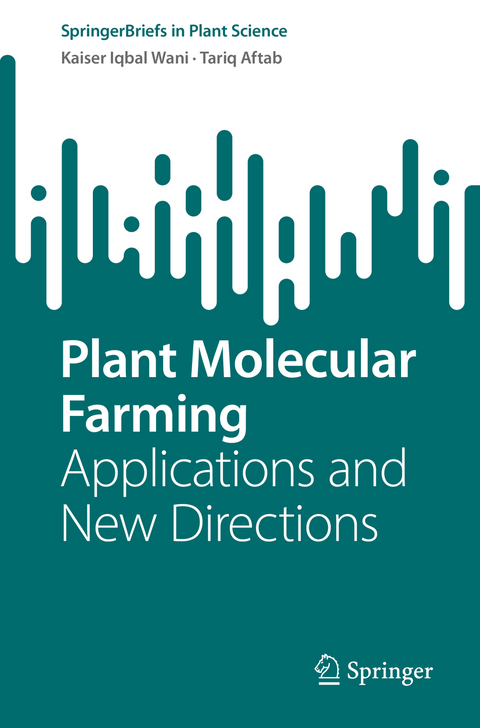
Plant Molecular Farming
Springer International Publishing (Verlag)
978-3-031-12793-9 (ISBN)
Molecular farming is a biotechnological approach that includes the genetic adjustment of agricultural products to create proteins and chemicals for profitable and pharmaceutical purposes. Plant molecular farming describes the manufacture of recombinant proteins and other biologically active product in plants. This approach depends on a genetic transformation of plants that can be accomplished by the methods of stable gene transfer, such as gene transfer to nuclei and chloroplasts, and unstable transfer methods like viral vectors. The requirement for recombinant proteins in terms of quality, quantity, and diversity is increasing exponentially This demand is traditionally met by recombinant protein construction technologies and the engineering of orthodox expression systems based on bacteria or mammalian cell cultures. However, majority of developing countries cannot afford the high costs of medicine derived from such existing methods. Hence, we need to produce not only the new drugsbut also the cheaper versions of those already present in the market. Plant molecular farming is considered as a cost-effective technology that has grown and advanced tremendously over the past two decades.
This book summarizes the advances and challenges of plant molecular farming for all those who are working on or have an interest in this rapidly emerging area of research.
Kaiser Iqbal Wani is currently working as a Senior Research Fellow at the Department of Botany, Aligarh Muslim University, Aligarh, India. He is a recipient of a prestigious national fellowship CSIR/UGC JRF to pursue his Ph.D. Besides, he has also qualified some other national-level exams like the Graduate Aptitude Test in Engineering (GATE) in life sciences and JKSET. His research is focused on molecular, proteomic, physiological, and biotechnological studies on medicinal plants under adverse environmental conditions. He has a number of research publications to his credit in peer-reviewed international journals. Besides, he has also a number of chapters in edited volumes with international publishers. Tariq Aftab received his Ph.D. in the Department of Botany at Aligarh Muslim University, India, and is currently an Assistant Professor there. He is the recipient of a prestigious Leibniz-DAAD fellowship from Germany, Raman Fellowship from the Government of India, and Young Scientist Awards from the State Government of Uttar Pradesh (India) and Government of India. After completing his doctorate, he has worked as Research Fellow at National Bureau of Plant Genetic Resources, New Delhi and as Post-doctorate Fellow at Jamia Hamdard, New Delhi, India. Dr. Aftab also worked as Visiting Scientist at Leibniz Institute of Plant Genetics and Crop Plant Research (IPK), Gatersleben, Germany, and in the Department of Plant Biology, Michigan State University, USA. He is a member of various scientific associations from India and abroad. So far, he has edited 12 books with international publishers, including Elsevier Inc., Springer Nature and CRC Press (Taylor & Francis Group), co-authored several book chapters, and published over 60 research articles in peer-reviewed international journals. His research interests include physiological, proteomic, and molecular studies of medicinal and crop plants in challenging environmental conditions.
Chapter. 1. Molecular Farming in Plants: Introduction and Applications.- Chapter. 2. Tools and Techniques Used in Plant Molecular Farming.- Chapter. 3. Production of plant natural products in heterologous microbial species.- Chapter. 4. Sustainable Manufacturing of Vaccines, Antibodies, and other Pharmaceuticals.- Chapter. 5. Limitations, Biosafety, ethics, regulatory issues in molecular farming in plants.- Chapter. 6. Conclusion and Perspectives.
| Erscheinungsdatum | 25.08.2022 |
|---|---|
| Reihe/Serie | SpringerBriefs in Plant Science |
| Zusatzinfo | IX, 77 p. 10 illus., 9 illus. in color. |
| Verlagsort | Cham |
| Sprache | englisch |
| Maße | 155 x 235 mm |
| Gewicht | 147 g |
| Themenwelt | Naturwissenschaften ► Biologie ► Botanik |
| Technik ► Umwelttechnik / Biotechnologie | |
| Schlagworte | Edible vaccine • monoclonal antibody • pharmaceuticals • Plant-derived proteins • recombinant protein • Transient expression |
| ISBN-10 | 3-031-12793-5 / 3031127935 |
| ISBN-13 | 978-3-031-12793-9 / 9783031127939 |
| Zustand | Neuware |
| Haben Sie eine Frage zum Produkt? |
aus dem Bereich


